I started looking into this issue in April 2020 as an amendment to the contract between the FDOC and JPay showed their clear intention to get rid of the “real” mail and have the incoming mail sent to an outside company that will scan everything.
They planned to take away the JP5 tablets the incarcerated people bought, to “give” them a JP6 loaner instead. A very obvious step towards processing regular mail electronically.
Besides the fact they have to turn in a tablet they own for a loaner, my main concerns were the replacement of the regular mail by OCR (Optical Character Recognition – (is OCR good enough to read cursives?).) emailed through JPay, the full control of the FDOC of all means of communication (including inmates’ grievances), and the back-up of personal letters by a private company and the DOC for many years, apparently even after release.
A notice of development of rulemaking was published on Chapter 33 on 9/16/2020 regarding routine mail being processed electronically in the future. The preliminary draft was still not available. I requested a copy of it and a workshop regarding the rule proposal. I received a response about a month later that the FDOC had “chosen not to pursue the promulgation of proposed Rule 33-210.1011, F.A.C. Rather, instead of having the processes and protocols related to electronic mail scanning stated in a separate rule, they will be incorporated into Rule 33-210.101, F.A.C. (Routine Mail).”
Well, the draft is here…
The FDOC is trying to limit A LOT what its residents can receive and shows intent of incoming mail being processed electronically by a third party.
The FDOC is trying to limit A LOT what its residents can receive and shows intent of incoming mail being processed electronically by a third party.
There are two different ways the Department of Corrections in the US are trying to limit the incoming mail: when they make a copy for the incarcerated (which usually requires the family to only write on one side of the paper), store the original for a while, then discard it, and when they want to use Optical Character Recognition to send the letters as emails. Though of course, it is really about money, they pretend it is to avoid contraband / for security measures, so they would absolutely argue it is for penological interest.
I looked at Turner Vs Safley and I believe this is an “exaggerated response”. Mail has been coming to prisons for as long as they have existed, so it’s hard to suggest an alternative because all we want is incarcerated people to keep getting paper. In Florida, they want to get everything going through JPay and their tablet which I think is the most restrictive alternative. I don’t know if it affects the incarcerated’s amendment rights, but I believe it affects the senders?
I believe, for example, that children have the same constitutional rights as adults. Young children, or maybe non-verbal adults, may only express themselves through drawings. If it is possible to copy a drawing (though we can argue how much of the expression is removed when we pass from a colored original to a black and white bad quality photocopy), it is not possible to send a drawing by email. Nowhere they explain how they would deal with things like that. Their freedom of speech would certainly be attacked?
Today, we are allowed to send different things, like newspaper clippings, print outs, etc. We can attach up to 15 additional pages to a unlimited handwritten letter. From this draft, we see they try to impact the incarcerated’s right to information but limited everything we can send to one LETTER envelope (no big envelopes anymore) with ONE forever stamp (how about foreign mail? Guess they didn’t think it through…).
My other concern is the right of privacy (I know it’s an implicit right), with the letters being available to any DOC employees for some time, then to any governmental agency for years, possibly for ever, even after release. I found this case, Whiterow Vs Paff that mentions the need to avoid “unnecessary intrusion”. Today the mail only goes through the mail room employees and doesn’t stay available to them and everyone else around for years.
I personally tell pretty much everything to my husband on paper. Every little detail, my occasional rants, how I slept, my worries, how I was sick (would this violate HIPAA? lol I’m throwing everything out there!) and everything you can imagine. If this were to end up all in a database for the next 70 years, it would definitely impact what I write, and so my relationship. Maintaining family links should be a number one priority for the DOC since it is the best tool for rehabilitation.
This is a version of the proposed rule with quick annotations:
I personally tell pretty much everything to my husband on paper. Every little detail, my occasional rants, how I slept, my worries, how I was sick (would this violate HIPAA? lol I’m throwing everything out there!) and everything you can imagine. If this were to end up all in a database for the next 70 years, it would definitely impact what I write, and so my relationship. Maintaining family links should be a number one priority for the DOC since it is the best tool for rehabilitation.
This is a version of the proposed rule with quick annotations:
Please request a workshop to try to block some changes:
Email: Paul.vazquez@fdc.myflorida.com
Subject: 33-210.101 Routine Mail Request for Public Workshop
You don’t need to write a lot, just explain that as someone who write to people in the FDOC care you are directly affected by this rule under F.A.C. 120.536(3) and you want to request a workshop, in public or virtual if needed, where prison families will be fairly represented.
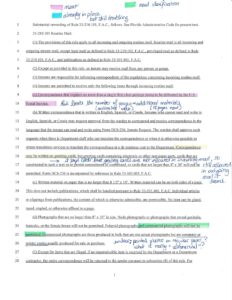
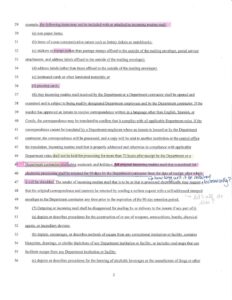
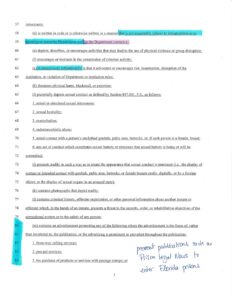
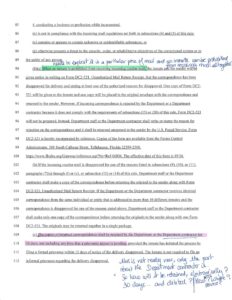
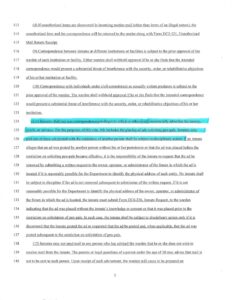
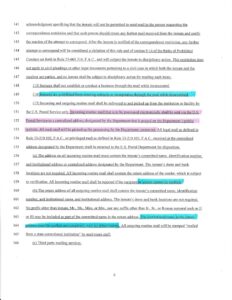
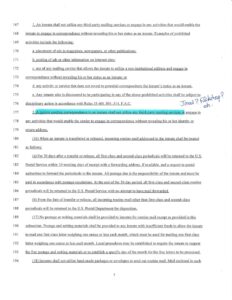
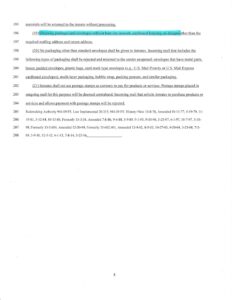

Leave a Reply